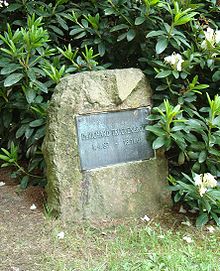Richard Truckenbrodt
Richard Johann Truckenbrodt (born April 4, 1887 in Johanngeorgenstadt ; † November 18, 1961 in Annaberg-Buchholz ) was a German ethnologist , Ore Mountains dialect - and local researcher, hotelier and teacher .
Life
He is the son of hotelier and city councilor Carl Truckenbrodt (1856–1937) and was born in his Hotel de Saxe (from 1914 Sachsenhof ) on the market square of Johanngeorgenstadt. After attending elementary school in his hometown and the Rutheneum grammar school in Gera , he studied German and ancient philology at the universities in Leipzig , Munich and Jena and in 1914 passed the examination for the higher teaching post.
From 1906 to 1907 he served in the 7th Thuringian Infantry Regiment No. 96 in Gera and took part in the First World War from 1914 until the end of 1918.
After the end of the war he worked as a teacher at the grammar school in Schneeberg , but was put on hold in 1924 due to the staff reduction law. He spent the free time that he had involuntarily enjoyed at the universities in Berlin and Halle studying natural sciences and the humanities in the field of local history and dialect research, which he had been concerned with since his youth. His studies were particularly supported by Professors Draw, Holtzmann and Bremer in Halle. In the latter, he received his doctorate in 1926 with a thesis on westerzgebirgischen folklore to Dr. phil. Georg Baesecke was co- referee .
Even after obtaining his doctorate, he did not succeed in returning to teaching. After his father's death in 1937, he took over the management of his father's Hotel Sachsenhof in Johanngeorgenstadt, the first hotel on the square. He met the hotel cook Martha Göring, whom he married on April 3, 1943 in Gera. The marriage remained childless. After the occupation of Johanngeorgenstadt by Soviet troops and the start of uranium mining by the later SDAG Wismut , the hotel had to close. The house in the city center of Johanngeorgenstadt was razed to the ground immediately after 1953 and the location of the hotel was reforested.
Richardt Truckenbrodt joined the LDPD , ran for the city council in Johanngeorgenstadt in 1946 and returned to the profession he had learned. He took a position as a teacher at the grammar school in the district town of Schwarzenberg / Erzgeb. , the extended secondary school " Bertolt Brecht ". During this time he continued to research the local history and folklore of the Ore Mountains . His special merits include a. the decades-long efforts to maintain and preserve the Erzgebirge dialect (he was friends with the Erzgebirge singer Anton Günther until his death in 1937 ), the rediscovery of several folk songs and poems that have already been forgotten, such as B. the " Preißhauslied " and the research of Erzgebirge Christmas traditions, such as. B. the tradition of erecting candle arches , which was originally limited to Truckenbrodt's hometown.
Richard Truckenbrodt's scientific estate is now kept in the Museum Schloss Schwarzenberg .
Works
- To the West Ore Mountains folklore. Contributions to the knowledge of the dialect, folklore and settlement of the western Ore Mountains due to the dialect of Johanngeorgenstadt. Halle ad Saale, 1926.
- The Erzgebirge mountain chop in Norway . In: Glückauf 47 (1927), pp. 54-55.
- What can we do to research our dialect? . In: Glückauf 48 (1928), pp. 157-159.
- Our dialect, school and home . In: Glückauf 49 (1929), pp. 66-70.
- Erzgebirge Christmas . In: Glückauf 49 (1929), pp. 254-255.
- The Schwibbogen . In: Glückauf 50 (1930), pp. 296-297.
- De Teiflsscheib . In: Glückauf 51 (1931); Pp. 125-126.
- Proposal to establish a dialect corner in Glückauf . In: Glückauf 57 (1937), pp. 73-76.
Web links
- Tradition - mining culture and romanticism
- Literature by and about Richard Truckenbrodt in the Saxon Bibliography
| personal data | |
|---|---|
| SURNAME | Truckenbrodt, Richard |
| ALTERNATIVE NAMES | Truckenbrodt, Richard Johann |
| BRIEF DESCRIPTION | German ethnologist and teacher |
| DATE OF BIRTH | April 4, 1887 |
| PLACE OF BIRTH | Johanngeorgenstadt |
| DATE OF DEATH | November 18, 1961 |
| Place of death | Annaberg-Buchholz |

